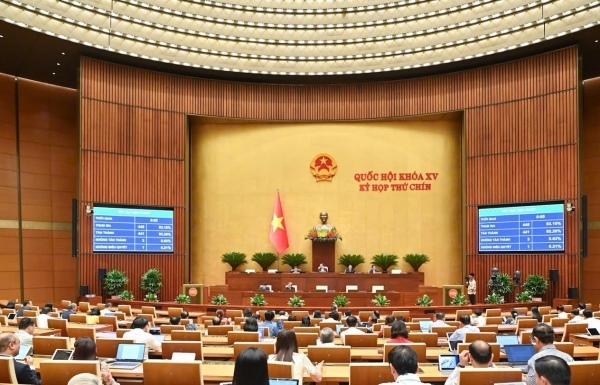National Assembly adopts Law on Digital Technology Industry
National Assembly adopts Law on Digital Technology Industry
The National Assembly adopted the Law on Digital Technology Industry on June 14, creating a legal framework for the industry to grow in the future.
Following the enactment, Vietnam now becomes the first country in the world to promulgate a separate law on digital technology industry, helping the country position itself in the global technology value chain, competing on par with the world's leading digital economies.

The National Assembly voting to adopt the Law on Digital Technology Industry. Photo: MoST |
The law has promptly institutionalised many aspects of Resolution No.57-NQ/TW and Resolution No.68-NQ/TW of the Politburo, such as incentives and supports for the development of digital technology enterprises; developing high-quality workers and digital technology talents; developing essential digital technology infrastructure; supporting innovative startups; building an ordering mechanism; and building a legal framework for a controlled pilot.
Projects with large investment capital will enjoy corporate income tax reduction for many years, along with financial support from the Development Investment Fund.
Moreover, administrative procedures are simplified through a mechanism of decentralising authority to provincial people's committees to establish digital technology industrial parks and applying a 'green channel' customs priority regime.
The state also prioritises investment in essential infrastructure such as data centres and 5G networks, while encouraging private enterprises to participate in developing modern infrastructure.
The law is also expected to enable Vietnamese tech firms to go global. The state will build a network of Vietnamese digital technology representatives in key markets, combining with international cooperation initiatives, helping Vietnamese enterprises gradually become multinational companies, competing equally with large technology corporations in the world.
To boost digital transformation and increase the proportion of enterprises applying digital technology, the law implements comprehensive solutions to improve efficiency and competitiveness.
In particular, the digital technology industry development scheme supports businesses through promotion activities, digital skills training, and providing technology solutions suitable for each industry. The state also provides financial support and costs for deploying digital technology for small and medium-sized enterprises (SMEs), creating a favourable environment for digital technology to penetrate deeply into all economic sectors.
Vietnam aims to increase the number of digital technology enterprises to 150,000 by 2035.
In order to build a strong digital technology business ecosystem with the goal of having 150,000 enterprises by 2035, the law provides comprehensive support policies. For instance, SMEs are supported with infrastructure investment costs, high-quality human resource training, and prioritised to participate in bidding for public procurement projects.
In terms of finance, the state will provide investment capital for technological innovation projects, helping companies improve their creativity and competitiveness. Digital technology production projects and supporting enterprises will receive tax incentives similar to those in particularly difficult areas, while attracting foreign investment to increase production capacity.
The development of digital technology industry zones also has attractive incentive policies to create an environment for businesses to start up and develop sustainably, contributing to realising this strategic goal.
To ensure autonomy in core technology, strategic digital technology and ensure national security sovereignty in technology, the law focuses on mastering core technology and strategic digital technology. Research and development (R&D) activities enjoy the highest incentives, including corporate income tax exemption for R&D projects and financial support for building advanced research infrastructure.
The state will order enterprises to develop strategic technologies such as AI, big data, and blockchain.
The law also aims to create powerful businesses which can lead the digital technology industry through strategic policies. It also hoped to develop Vietnamese-made products and services by giving priorities to them in public procurement and supporting for international market expansion to improve their competitiveness.
Additionally, the law provides comprehensive solutions and policies for human resource development; as well as those for development and management of digital assets.
- 11:51 16/06/2025


























